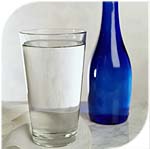|
|
| Water | |
Water:
Experts say too much is as bad as too little For according to women's magazines, most supermodels and girlfriends, the answer couldn't be simpler. Water. Drink at least 2 liters a day — more if you can. As for detox, it's a virtual panacea — most health spas these days offer waterings at both ends. Recent research, however, suggests that guzzling water might not be such a good idea. Dr. Robert Alpern, a kidney specialist at the University of Texas, not only contends that the 2-liter rule has no scientific basis, but warns that excessive consumption may cause harm. "Drinking large amounts of water can strain the kidneys, causing excess loss of the mineral salts, sodium and potassium," Dr. Alpern explains. "This can lead to hypoatraemia, or water intoxification, a potentially fatal condition where the blood becomes over-diluted and the cells begin to swell." Women embarking on self-styled detox regimes, which "flush out" toxins with 4 to 5 liters of water a day, are particularly at risk — the kidneys can only produce about 14 to 15 liters of urine in 24 hours, explains Professor Steven Sacks, head of renal medicine at Guy's and St. Thomas's School of Medicine in London. That's just over half a liter an hour at the most. If you drank a liter each hour over four or five hours, you might end up feeling nauseous, apathetic and dizzy, typical symptoms of water intoxification. If you drank more, you could be putting your life at risk. But even at far lower levels we may be drinking more water than we need. Much of our water comes from food — many fruit and vegetables are 80 percent water while meat is around 50 percent. "If you ate fruit for breakfast, a large bowl of soup at lunch and plenty of vegetables at dinner, you might need a few glasses of water," says Dr Herman Keppler, principal of the College of Naturopathic Medicine. "If you were a fruitarian and ate only fruit, you probably wouldn't need any at all." In other words, the idea that everyone should drink 2 liters of water a day is a myth. While most people lose about 2.5 liters of water a day through sweating, breathing and urination, how much you should drink depends on diet, size and work environment as well as exercise. Patrick Holford, author of The Optimum Nutrition Bible and Natural Highs (Piatkus Books) points out that the body makes about a third of a liter a day as a by-product of burning energy. "People are often confused about the amount of water they need," he says. "You make water as well as losing it, and you can obtain as much as a liter of water through food a day. "There's also confusion about how to get water. All fizzy drinks, tea and coffee are diuretics, meaning you lose more fluid than you take in. Conversely, coconut or watermelon juice can be more hydrating than water because they replace the mineral salts those you lose through sweating." There's no doubt that knowing how to meet your body's water requirements is vital. The body is 67 percent water and without it, we'd only live for about four days. Carrying nutrients and waste products to and from tissues, water enables electrical signals to pass between cells, works as a lubricant between joints and cushions the spine. As it is involved in virtually every bodily function, even slight dehydration can have notable consequences — a 2 percent loss of water can lead to a 20 percent drop in energy levels. Chronic, low hydration may contribute to conditions such as back pain, asthma, excess body weight and raised blood cholesterol, says Dr. Fereydoon Batmanghelidj in his book, Your Body's Many Cries for Water. But how can you figure out how much you need? Holford suggests common sense. "People often ignore their bodies and only drink water if their mouth is dry and they're raging with thirst. But if you listen carefully, you can sense when your body wants water long before that stage." Holford recommends fruit and vegetable juices, particularly watermelon juice, if you want to hydrate fast. Avoid dehydrating drinks such as tea, Coca-Cola and coffee — if you do drink them, compensate with an extra glass of water. Where you get your water from makes a difference too. Recent research has found tap water to contain up to 6,000 chemicals, including pesticide residues, estrogen-mimicking molecules and residues from as many as 60 commonly used pharmaceutical drugs. Filtered and mineral water is purer, but according to Derek McConnell, director at the Pure H2O Company, even bottled water can contain heavy metals such as arsenic and cadmium and other chemical impurities. Carbon filters improve the taste of tap water by removing some chemicals, but many remain. The best source of water for the body, he insists, is rainwater. "It has a lower surface tension so is 'wetter' — the water molecules enter cell membranes more easily, so hydrate your body at a deeper level," he says. Fine for those who have nothing better to do than stand in the rain with a bucket. But what about normal people? For a similar price to bottled water, there are water purification systems, McConnell explains, that create the equivalent of your own rainwater, on tap. Fitted under your sink, they eliminate all known chemical impurities and heavy metals through a process called reverse osmosis. The filters also remove water's negative charge — a property that makes red-blood cells clump together. As for your water requirement, a key yardstick is urine color. If it's dark yellow, you're probably not drinking enough. If it's virtually colorless and you're on the toilet all the time, you might be overdoing it. Don't cut down too much though — according to Holford, peeing releases endorphins, feel-good chemicals in the brain. It makes you high. Good Luck! |

